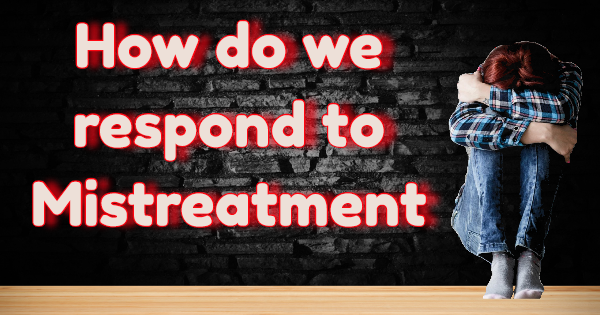How Should We As Christians Respond When Mistreated?
A Study Outline
I. Our response when mistreated runs to the heart and core of Christian behavior, to the whole meaning of the law and prophets [Do unto others as you would have others do unto you (Matthew 7:12)], and to bring every thought into obedience to Christ (II Corinthians 10:5).
II. We are often treated unjustly within this society which is based on Satan’s wavelength, wherein people try to rule over other people instead of serve and aid others to bring about true freedom and liberty.
A. Laws are often made so that virtually no one can keep them perfectly, and everyone becomes a criminal.
B. Common sense is seldom rewarded.
C. Satan is the God of this world (Ephesians 2:2), seeking whom he may devour (I Peter 5:8-9).
III. Being mistreated in this world is guaranteed for God’s people, as God’s selfless ways lived within our lives clash with Satan’s hedonistic ways built into this society’s’ hierarchical institutions.
A. All of the righteous: Psalm 34:19; yet, all of Psalm 34 shows that we are delivered from such evil.
B. Paul: II Timothy 3:11-12; II Corinthians 11:23-27
C. The prophets: Hebrews 11:36-38
D. We can be certain that Satan will try to attack anyone who is promoting the name of Jesus Christ and His ways in this world: I Peter 2:19-23
IV. Our main commission in responding to mistreatment: Do good in the face of evil!
A. God’s basic approach is summarized in Matthew 3:38-48.
1. Do not resist evil, but turn the other check.
2. If someone sues you, give him what he asks.
3. If compelled to travel one mile, go with him two miles.
4. Give to someone who borrows from you.
5. Love your enemies.
6. Bless those that curse you; see also Romans 12:14.
7. Do good to those that hate you.
8. Pray for those who spitefully use and persecute you.
B. Keep doing good, and let God take vengeance on the other party.
1. Romans 12:19
2. I Peter 2:21-23 (noted earlier)
3. Give food and drink:
a. Romans 12:20
b. Exodus 23:4-5
c. Proverbs 25:21-22
d. Matthew 5:44 (noted earlier)
C. Do not render evil for evil, but rather blessings for evil.
1. I Peter 3:9
2. Proverbs 20:22
3. Romans 12:17
4. I Corinthians 4:12
5. I Thessalonians 5:15
D. Imprecatory scriptures: Psalm 7:11-17; 35; 58; 69; 83; 109; 137
V. Praying for our enemies involves asking God to do good towards them, but only upon their repentance and turning from their evil cam we become friends (as defined in John 15:14); we may rightfully pray for the demise of those who refuse to turn from evil.
A. When we do good to those who do evil towards us we “heap coals of fire on their heads” for those that have a conscience, thus convicting them of wrong-doing and moving them towards repentance.
B. Praying for our enemies does not necessarily mean they will be our friends, especially if they continue in their hatred towards us; thus, David offered imprecatory prayers towards his enemies.
VI. Scriptural examples of dealing with mistreatment:
A. Jesus Christ
1. With the Pharisees: Matthew 23:13-19
2. With much of mankind: Isaiah 53:3-10
3. When Peter cut off the servant’s ear: Luke 22:47-51
4. When on the stake: Luke 23:33-34
5. He never battled His enemies with swords, but with words: John 10:31-39
B. Elijah: II Kings 16:8-23
C. Paul. He was not afraid to face his enemies continually and testify with the words of
Jesus Christ, even though in danger of his life.
— Acts 21:27-40; 22:1-23


